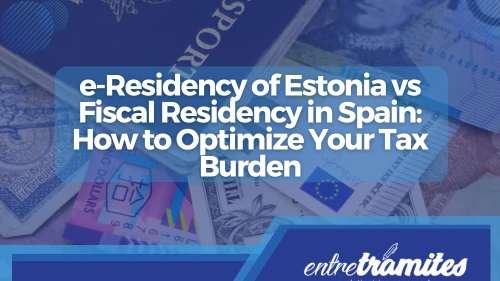As entrepreneurs, freelancers, and digital nomads navigate the globalized economy, managing their tax responsibilities efficiently is essential. Two attractive options for optimizing your tax burden are e-Residency of Estonia and Fiscal Residency in Spain. Both offer unique advantages, but choosing the right path depends on your business structure, income, and long-term goals. Let’s explore how you can leverage both Estonia’s e-Residency and Spain’s fiscal residency to optimize your tax situation.
What is e-Residency of Estonia?
Estonia’s e-Residency program allows non-residents to start and manage a business in Estonia entirely online, without being physically present in the country. This digital identity gives access to Estonia’s e-services, enabling entrepreneurs to register a company, sign contracts, and manage business finances, all from anywhere in the world.
Key Benefits of e-Residency:
- Global Business Management: Conduct business from anywhere, offering great flexibility for digital entrepreneurs, remote workers, and freelancers.
- Favorable Tax Environment: Estonia’s corporate tax system is highly attractive. Estonia’s corporate tax rate stands at 20% for profits distributed as dividends. However, corporate tax is not applied on retained earnings, meaning companies can reinvest profits without immediate taxation. This is a huge advantage for businesses aiming to grow.
- Digital Infrastructure: e-Residents benefit from secure, efficient digital platforms for business administration, including online banking, accounting, and invoicing.
- Accessibility and Affordability: Estonia has over 85,000 e-Residents from 170+ countries, demonstrating the program’s global appeal and the ease with which digital entrepreneurs can access the Estonian market.
What is Fiscal Residency in Spain?
Fiscal residency refers to the country where an individual or business is considered a tax resident, based on factors such as their place of living, business activities, and income sources. In Spain, an individual becomes a fiscal resident if they spend more than 183 days in the country in a calendar year or if Spain is the center of their economic interests.
Key Considerations for Fiscal Residency in Spain:
- Progressive Income Tax Rates: Spain applies a progressive personal income tax system, which means that higher income earners are taxed at higher rates. The rates range from 19% to 47%, depending on income levels:
- 19% for income up to €12,450.
- 24% for income from €12,450 to €20,200.
- 47% for income above €300,000.
- Corporate Tax: Spain’s corporate tax rate is generally 25%, but small businesses can benefit from a reduced rate of 15% for the first €300,000 of taxable income.
- Social Security Contributions: For self-employed individuals, Spain’s self-employment social security contribution can be significant, with rates around 30% of income. However, there are reductions for certain groups, including the ‘tarifa plana’ (flat rate) for new self-employed individuals, which offers discounts for the first year.
How to Optimize Your Tax Burden
While both options provide unique benefits, the right choice depends on your situation. Here’s how you can optimize your tax burden by considering both e-Residency in Estonia and fiscal residency in Spain:
- Use e-Residency to Set Up an Estonian Company:
- Business Incorporation: Set up a company in Estonia under the e-Residency program. Estonia’s corporate tax system allows you to defer taxes on retained earnings, providing flexibility for growing your business. For example, no tax is paid until profits are distributed as dividends, which could be reinvested to fuel business growth.
- No Double Taxation: Spain has a Double Taxation Agreement (DTA) with Estonia, which means that if you’re a fiscal resident in Spain but own an Estonian company, you won’t pay double taxes on your income. You can manage your profits through your Estonian company and only pay taxes on dividends when you choose to distribute them. This helps to avoid being taxed on the same income in both countries.
- Maintain Fiscal Residency in Spain for Personal Income:
- As a fiscal resident in Spain, you’ll pay taxes on your worldwide income. However, Spain offers various deductions that can help reduce your taxable income. For example, the personal allowance for tax residents in Spain in 2024 is up to €5,550 depending on income level and family situation.
- Non-Habitual Resident (NHR) Program: Spain offers the NHR tax regime, which provides favorable tax rates for new residents, including a 24% tax on foreign income for the first 6 years. This can significantly lower your personal tax burden if you qualify.
- Leverage Estonia’s Corporate Tax System for Long-Term Growth:
- If your business is reinvesting its profits into growth and innovation, Estonia’s corporate tax system is ideal. As an e-Resident managing an Estonian company, you can delay taxes on retained earnings, allowing your company to grow faster without the immediate pressure of tax liabilities.
- Estonia’s absence of dividend taxation (until dividends are paid out) allows for more control over when and how you take profits, helping you manage your tax strategy effectively.
By combining e-Residency of Estonia with fiscal residency in Spain, you can create a powerful tax optimization strategy. Estonia’s digital infrastructure and tax deferral system give you the flexibility to manage your business globally, while Spain’s fiscal residency offers opportunities to reduce personal tax liabilities through tax allowances and favorable programs for entrepreneurs.
To maximize your tax savings, consider consulting with an expert who can guide you through the process. Entre Trámites offer a personalized free consultation to help you navigate the complexities of both Estonian e-Residency and Spanish tax residency. Our experts can help you design a tax strategy tailored to your specific business needs.





